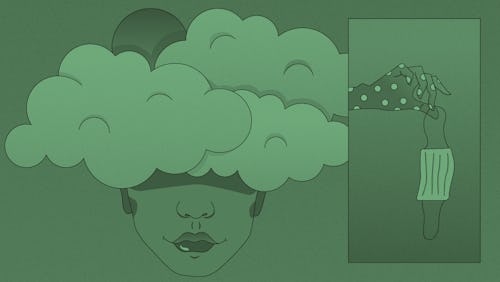If you had COVID, you might be at higher risk for depression
A large new study confirms that COVID survivors are more likely to develop mental illness than those who never had it.

Quarantine has seriously jeopardized our mental health in ways we’re just beginning to understand and it turns out that those of us who caught COVID may be at an even higher risk for mental disorders. A large study released this week found that people who had COVID were more likely to be diagnosed with anxiety or depression in the months after they recovered, according to the New York Times.
The research, which was published in The BMJ journal, looked at the records of 153,848 COVID survivors and compared them to the records of patients who had never been diagnosed with COVID, as well as a control group from before the pandemic. According to the data, those who recovered from COVID were 35% more likely to be diagnosed with anxiety disorder, while 39% were more likely to be diagnosed with depression than those in the control groups. Other mental health issues that increased after COVID included stress disorders, opioid use, substance abuse, brain fog and sleep disorders, all of which were more likely to occur in patients with severe infections.
To be clear, this study didn’t reveal a direct correlation; the records analyzed by the researchers showed that only a relatively small number of people were diagnosed with a mental health disorder after their COVID infections. The percentages above are projections based on comparison to people who never had COVID.
The study had some limitations, including the fact that researchers used data from the Veterans Health Administration database that mostly consisted of older, white men, as the researchers pointed out. Still, the data gives us a worrying window into the little understood long-term effects of this virus.
Although it’s not surprising that getting infected with a potentially deadly disease would impact our mental health, new research has found that there’s actually other surprising links between mental health issues and COVID. For one, we’re learning that our immune systems and our mental health are very closely tied and some studies have shown that mental stressors impact our immune system’s ability to fight infections, which leave us more vulnerable to viruses, according to Vox. One theory for why COVID patients are more likely to be diagnosed with mental health problems is that issues like anxiety, insomnia, or depression make a severe COVID infection more likely, as opposed to the other way around.
Whatever the reason behind the results, one thing is certain: Many of us are feeling more depressed, anxious, and exhausted than we were before the pandemic. A silver lining, though, is that more of us are also seeking help and taking active steps to improve our mental health. It seems like our culture will have to start being more forgiving of our mental health struggles, too.